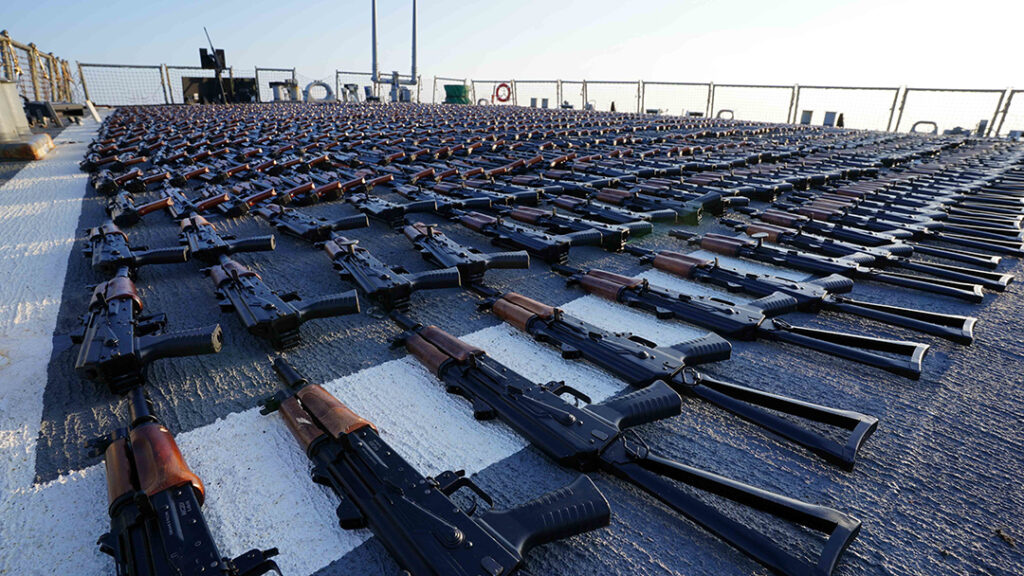ADF STAFF
For years, Iranian weapons have wound up in Somalia, where they are sold to violent extremist groups such as al-Shabaab and the Islamic State.
Through financial incentives, Iran established a proxy network in Somalia and has used the country to funnel weapons to the Houthi militia in Yemen since around 2016.
A new report by the Institute for Security Studies (ISS) revealed that the weapons smuggling network also likely extends to groups linked to al-Shabaab in Ethiopia, Kenya and Mozambique, fueling insecurity around the Horn of Africa.
Iranian weapons also are commonly transported to the Central African Republic, South Sudan and Tanzania, Foreign Policy magazine reported.
The illicit flow of weapons shows no signs of slowing.
In early January, U.S. forces intercepted a boat smuggling more than 2,000 AK-47 assault rifles in international waters between Iran and Yemen, the route historically used to traffic weapons to the Houthi militia. The seizure was the latest interception of arms bound for Somalia by U.S. forces in recent years.
But eliminating the scourge will require more than help from international forces, the ISS report argued.
Horn of Africa countries can already collaborate on maritime security through the Intergovernmental Authority on Development (IGAD) Task Force on the Red Sea and the Gulf of Aden. And the African Union Peace and Security Council has increased its efforts to stop arms trafficking.
Those strategies, the report argued, should be aligned with national and regional maritime policies, which requires the establishment of an advisory group in the AU Commission.
The report offers other suggestions that could help secure the region’s maritime domain. One idea is to expand the Contact Group on Piracy off the Coast of Somalia (CGPCS) mandate to include more maritime crimes.
The CGPCS is an international governance mechanism established in 2009 to combat piracy. That and other initiatives proved effective. From 2016 to 2021, just eight piracy attacks were reported off Somalia’s coast, compared to 358 between 2010 and 2015.
Another suggestion is to align the Nairobi Protocol for Prevention, Control and Reduction of Small Arms and Light Weapons in the Great Lakes Region, the Horn of Africa and the Bordering States with the AU’s Silencing the Guns initiative, which covers maritime crimes. The move could help governments collaborate on maritime security issues.
However, not all countries in the Horn of Africa and Great Lakes regions are parties to the protocol.
“This certainly means provisions of the protocol are not binding to non-state parties,” ISS report authors David Willima and Tshegofatso Ramachela told ADF in an email. “This creates a gap in cooperation at the sub-regional level and at efforts relating to prevention of the illicit small arms and light weapons manufacturing, trafficking and use.”
Also, the AU’s Silencing the Guns initiative requires African states to align their national strategies and policies with the AU’s continental frameworks.
“Without harmonization of policies across various levels, fragmentation, incoherency and stagnant implementation remain,” Willima and Ramachela said.
The ISS report also calls for an East African maritime task force steered by the AU and IGAD. Such a move could spur greater political and security cooperation in the region.
“Currently, there appears to be no formal discussions underway to form an East African maritime security force,” Willima and Ramachela said. “Ideally, discussions on formalizing an East African maritime security task force should be high up on the agenda of both the African Union and IGAD.”
In 2019, IGAD member states Ethiopia, Djibouti, Kenya, Uganda, Somalia, Sudan and South Sudan formed a task force to act as a platform for dialogue and to coordinate regional interventions.
That task force overlaps with several other initiatives in the region, such as the Combined Maritime Forces which established a new international naval task force in 2022 to enhance maritime security in the Red Sea.
Multilateral institutions such as the Red Sea Council also have been established to foster cooperation on economic and security matters including arms trafficking between Arab and African countries. Its members include Djibouti, Egypt, Eritrea, Jordan, Saudi Arabia, Somalia, Sudan and Yemen.
“It has been a welcome initiative,” Willima and Ramachela said. “However, it has been embroiled in geopolitical power dynamics and is sometimes viewed as exclusionary towards other regional countries such as Ethiopia, Turkey, Somaliland and the United Arab Emirates which undermines gains due to the transnational nature of maritime crimes.”

